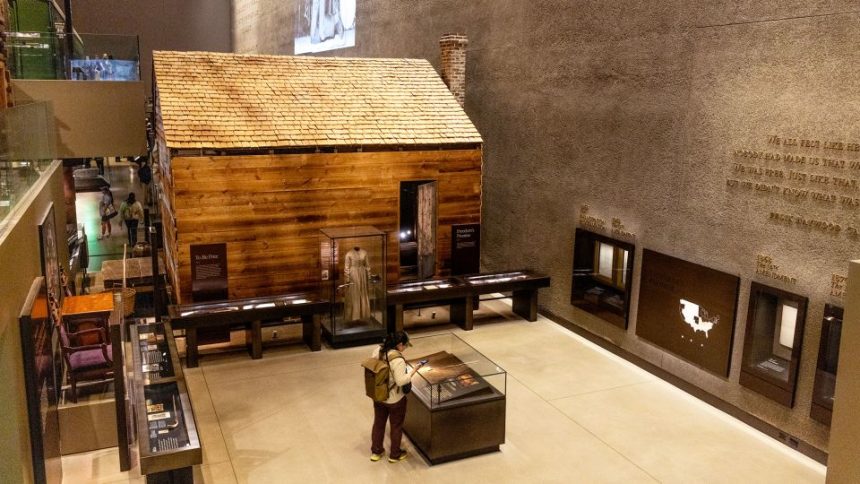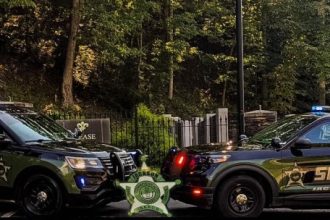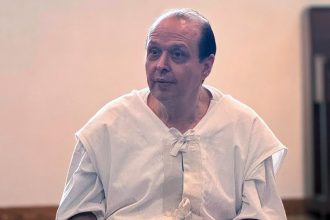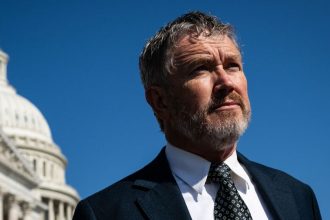President Donald Trump escalated his campaign to purge cultural institutions of materials that conflict with his political directives on Tuesday, alleging museums were too focused on highlighting negative aspects of American history, including “how bad slavery was.”
In a Truth Social post, Trump directed his attorneys to conduct a review of museums, comparing the effort to his crackdown on universities across the country.
“The Smithsonian is OUT OF CONTROL, where everything discussed is how horrible our Country is, how bad Slavery was, and how unaccomplished the downtrodden have been — Nothing about Success, nothing about Brightness, nothing about the Future,” Trump wrote.
Trump’s comments come days after the White House announced an unprecedented, sweeping review of the Smithsonian Institution, which runs the nation’s major public museums. The initiative, a trio of top Trump aides wrote in a letter to Smithsonian Institution secretary Lonnie Bunch III last week, “aims to ensure alignment with the President’s directive to celebrate American exceptionalism, remove divisive or partisan narratives, and restore confidence in our shared cultural institutions.”
The letter said the review would focus on public-facing content, the curatorial process to understand how work is selected for exhibits, current and future exhibition planning, the use of existing materials and collections and guidelines for narrative standards.
Bunch — who has served as Secretary of the Smithsonian Institution since 2019 and is the first African American to hold the position — has made multiple comments about the importance of educating people about slavery through the National Museum of African American History and Culture specifically. He told Smithsonian Magazine that part of the purpose of that museum “was to help a nation understand itself — an impossible task without the full recognition of the horrors of slavery.”
Exhibits at the Smithsonian take years of planning and are heavily evaluated by teams of scholars and curatorial experts before they make their debut. Janet Marstine, a museum ethics expert, said that the demands laid out by the Trump administration “set the Smithsonian up for failure.”
“Nobody could provide those kinds of materials in such a comprehensive way, in that short amount of time, and so it’s just an impossible task,” she said. The White House has asked the Smithsonian to provide a wide array of materials, from internal emails and memos to digital copies of all placards and gallery labels currently on display.
The Smithsonian declined to comment on Trump’s latest remarks. A White House official, asked about the attorney review process Trump described, said the president “will explore all options and avenues to get the Woke out of the Smithsonian and hold them accountable.”
Still, Trump’s efforts to target colleges and universities — which he is now comparing to his focus on Smithsonian museums — has been even more aggressive. His administration has moved to strip federal funding from higher education institutions for a variety of reasons, including allegations of antisemitism and failure to comply with certain policy changes. Columbia University recently settled with the Trump administration for more than $220 million dollars and Trump has also been in a protracted battle with Harvard University after his administration froze $2 billion in federal funding.
The Trump administration’s push to align federal support with his cultural agenda has extended beyond the nation’s capital. The Institute of Museum and Library Services and the National Endowments for the Arts and the Humanities canceled tens of millions of dollars in federal grants earlier this year, affecting small museums, library initiatives, arts programs and academic research projects across the country.
Trump has previously praised the Smithsonian museums, including the National Museum of African American History and Culture, which he toured during his first term as president.
“I’m deeply proud that we now have a museum that honors the millions of African American men and women who built our national heritage, especially when it comes to faith, culture and the unbreakable American spirit,” Trump said during remarks at the museum in February 2017. Later that month, Trump said the museum “tells of the great struggle for freedom and equality that prevailed against the sins of slavery and the injustice of discrimination.”
Earlier this year, Trump signed an executive order that put Vice President JD Vance, who serves on the Smithsonian’s Board of Regents, in charge of stopping government spending on exhibits that don’t align with the administration’s agenda. He also tasked a former member of his legal team, attorney Lindsey Halligan, with helping to root out “improper ideology” at the Smithsonian.
“Museums in our Nation’s capital should be places where individuals go to learn — not to be subjected to divisive narratives,” the executive order said.
The Smithsonian began a review of its own in June, and has repeatedly stressed its commitment to being nonpartisan. The institution told CNN in July that it was committed to an “unbiased presentation of facts and history” and that it would “make any necessary changes to ensure our content meets our standards.”
The Smithsonian was established in the 1840s by the US with funds from the estate of James Smithson, a British scientist. As a unique trust instrumentality that is supported by federal funds, it is not an executive branch agency, which makes it a complex question whether the Trump administration has the ability to control its exhibits. It is governed by a 17-member Board of Regents led by Chief Justice John Roberts.
Trump’s moves to review and alter the Smithsonian Institutions have sparked intense debate, including on CNN’s NewsNight with Abby Phillip, where Jillian Michaels, podcast host of “Keeping it Real,” recently defended Trump, saying “he’s not” whitewashing slavery.
“You cannot tie imperialism and racism and slavery to just one race, which is pretty much what every single exhibit does,” Michaels said, adding: “Every single thing is like, ‘Oh, no, no, no, this is all because White people bad,’ and that’s just not the truth.”
CNN’s Betsy Klein and Ethan Schenker contributed to this report.
This story has been updated with additional context.
For more CNN news and newsletters create an account at CNN.com









